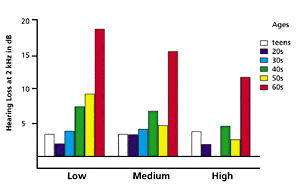According to researchers at the University of Illinois at Urbana-Champaign, some patients who suffer from tinnitus, or ringing in the ears, use different brain regions when processing emotional information.
Tinnitus, which affects nearly one-third of adults over age 65 and can cause varying degrees of disruption to daily life, may develop as part of age-related hearing loss or from significant noise exposure or a traumatic injury. While many tinnitus patients are forced to limit daily activities as a direct result of debilitating symptoms, others adapt to the condition. A recent study conducted by Fatima Husain, PhD, a speech and hearing science and neuroscience professor at the University of Illinois, was aimed at finding the reasons for this variation in adaptive responses to the condition.
“We are trying to understand how the brain adapts to having tinnitus for a very long time,” said Husain, who conducted the research with kinesiology and community health professor Edward McAuley, MD, PhD, and graduate students Jake Carpenter-Thompson and Sara Schmidt. Carpenter-Thompson is lead author on the study’s paper, which was published in the December 14, 2015 edition of the journal PLOS ONE.
Husain’s research uses functional magnetic resonance imaging (fMRI), an imaging tool that enables researchers to see changes in blood oxygen levels in the brain during an activity. As outlined in a July 3, 2014 article in Hearing Review, Husain’s team previously used fMRI to study how the brain processes emotion in patients with mild tinnitus compared to people without the condition. While in the scanner for the earlier study, participants listened to and rated pleasant, unpleasant, and neutral sounds (ie, children laughing, babies crying, and people babbling in the background). The findings of that study revealed that, in contrast to those without tinnitus, patients with mild tinnitus showed greater engagement of different areas in the brain when processing emotional sounds.
To further understand this altered brain activation, Husain conducted the more recent fMRI study. Because some patients adjust to the ringing in the ears while others do not, Husain and the team wanted to identify the differences among tinnitus patients. In addition to using fMRI scans, Husain’s team measured the severity of tinnitus according to associated distress with a series of surveys and questionnaires assessing hearing, attention, emotion, and sleep.
It was discovered that patients with lower tinnitus distress used an altered brain pathway to process emotional information. The path did not rely on the amygdala, commonly believed to play an important role in emotion processing in the brain. Patients who were better adapted to their tinnitus symptoms appeared to use more of the brain’s frontal lobe, a region critical for attention, planning, and impulse control. The researchers hypothesize that the greater activation of the frontal lobe in these patients might be helping to control their emotional responses to tinnitus, reducing distress.
A second aim of the study was to evaluate possible interventions to help patients reduce tinnitus distress. The researchers report that physical activity might influence emotion processing and help to improve quality of life for those who experience distress from tinnitus. Future research studies by Husain and her colleagues will reportedly explore active duty service members, a group that is greatly affected by trauma-induced tinnitus.
For additional information related to this study, read the article at Science.mic that highlights musicians and how their brains may process sound differently. Mic Staff Writer Max Plenke’s interview with Dr Husain provides additional details.
Source: University of Illinois








I’m a peruvian musician who suffers from hyperacusis and tinnitus. In 2006 both became severe. I was very desperate for several months. However, after I discovered some musical patterns on its different sounds, all of them stopped to produce annoyance on me, even if they were loud. Since then, I accepted my “musical tinnitus” and considered it as my own brain’s sounds. Here you can hear an simulation of one of the several patterns I’ve heard:
https://www.youtube.com/watch?v=RTTgu_9IB14
I have had tinnitus for 20 years. It all started very suddenly when a woman at a luncheon yelled at me and made me cry. Suddenly I couldn’t hear a thing. That lasted for about ten hours. That was replaced with the worse headache I have ever had then the tinnitus that is 24/7. I have tried everything! HELP!!!!!
I have had tinnitus for a year I’m 56. It started when I had the sudden loss of hearing in my right ear. The doctors call it dead ear. The tinnitus can be annoying at times. Looking for holistic options since conventional medicine has cure or options to elevate the ringing.
I have tinnitus since the day i remember. I have got adapted to it as thought the tinnitus is natural. most of thr time, it sounds like mulitple cricket or a monotone ring sound or mix of both.
i get to forget abt it when i am fully focused on some activity. thr ringing comes back the moment i realize that there is mo sound around.
I have had tinnitus since my childhood. I’m 45 now. Mine was caused by my step father slamming me to the wall, and beating my head in. He also kept hitting my ears. So mine was caused by damages. My brain has adapted to it, but there is times that it can get so loud, that the tv doesn’t help. I do want help for this. PLEASE!!!
I also have had tinnitus since October 13 2016 from the moment my son hit and screamed into my right ear. I miss the days before this happened. It is tragic that happened to you. I wish that something could be done to make it disappear.
I have had tinnitus since my teens. I am now 48. Always had an ear infection when I was small. 40% hearing loss in that ear and my eardrum is transparent. At first the ringing was so bad i could’nt sleep well and had difficulty studying in school. Over time I kinda got used to it I guess. It is constant. I kinda got to where I ignore it.Now tho a loud noise will make it louder. Also, when I lay down to sleep and it is quiet, I seem to notice it more and still have trouble falling asleep occasionally. Mine is high pitched and sounds like a tuning fork.
I’m learning more about Tinnitus. I have it badly. Any suggestions? Thank you – RS
Hi Rose, I just got T. last month. I had temporary thyroid problem that caused it. I have it bad too but I know most likely I’m stuck for life so I habituate. I sit outside & read cause crickets are God’s creation for us- T. is cancelled out by those chirping little bugs!- try it. I am Barrett, I am 62. We could have something much worse than T. so I pray constantly that this T. does not cause more problem but some people have for decades & no other complications. I read bible too cause God promised scripture is medicine for our body. Don’t pop your ears or blow nose hard. There are white-noise hearing-aids that are tuned to your specific T., very expensive but are wonderful to cancel out your T. but in mean time click on white-noise selection on your computer for hours (or order C.D.). Take vitamins, get regular exercise & depend on God to get us thru each day. I simply will not let the demon bastard get to me cause the only time I notice it is in silence so I use my white-noise selections. The key is you need to know that this thing cannot beat us; it is cancelled by decision- I decide to cancel it out & listen to Cathedral Bells… try them, I love theme especially the falling sincronised harmoneous bells. I never get tired of them, you must try them on the net. God Bless, Barrett
I’m deaf on one ear (R) and I’m interested in this product. Pls tell me how I can obtain this device and what is the cost of the whole process. I’m in NYC I live in the Bronx.
So sorry, Victor. There is no patient device associated with this study, and no product available for purchase. In the research lab they are using fMRI to observe patients and track how their brains are processing tinnitus.
I have had tinnitus for about 8 years. I can tell you it is much worse in the evening than it is in the morning. In the evening, I have to raise the volume on the TV because my tinnitus is so loud. In the morning when I turn on the TV I have to lower the volume. I very seldom have ringing, mostly just hissing. And, yes, I am now having hearing loss.